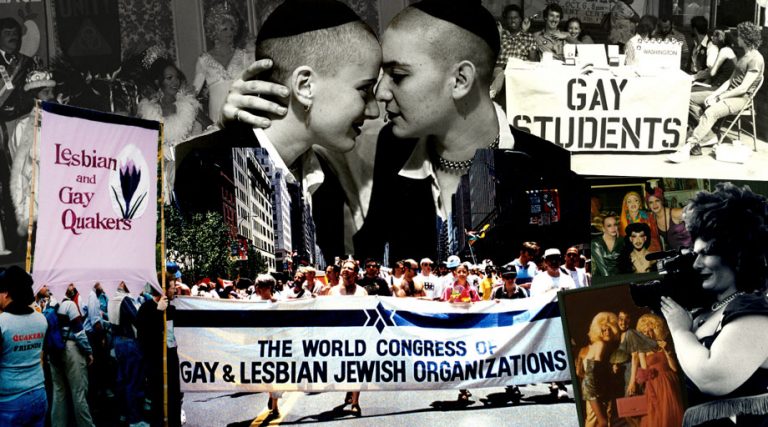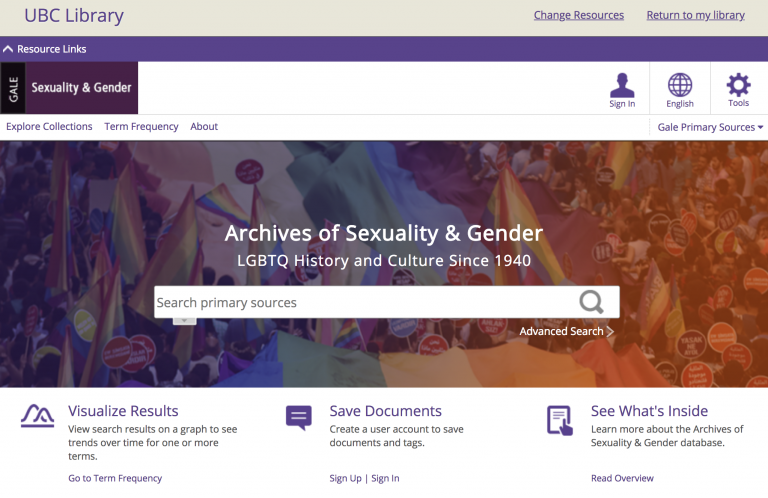
From centre (Clockwise): GALE|MRBPKD848633979, GALE|VDNLKE677938231, GALE|NPUKGT030146335, GALE|NIZAFI289627721, GALE|MNJPMK81931159, GALE|UQQGLJ332090963, GALE|XFBNIF392456507.
UBC Library users now have access to more than 1.5 million pages of rare and unique primary source content that offers an expansive and detailed look at LGBT2SQIA history. LGBTQ History and Culture Since 1940, Part II is a fully searchable archive that includes periodicals, newsletters, manuscripts, government records, organizational papers, correspondence, posters, and other primary source materials primarily from Canada and the United States.
Much of the content, selected by an advisory board of leading scholars and librarians in sexuality and gender studies, has never been available to the public.
“It is quite an impressive resource,” says Keith Bunnell, Reference and Collections Librarian, Humanities & Social Sciences Division, “The Library saw the potential for this archive to be useful to scholars in all kinds of fields.”
Most notably, the archive provides coverage of underrepresented communities and marginalized groups – even within the LGBT2SQIA community through access to key publications. “This database supplies rich evidence of racial, ethnic, religious and gender diversity, including the records of Gay American Indians, Asian Pacific Lesbians and Gays, Twice Blessed Jewish American lesbians, gays, bisexuals, and trans people, and the Lesbian and Gay Christian Movement,” says Professor Becki Ross of UBC’s Department of Sociology and Social Justice Institute. As Ross explains, “Indigenous students and allies will be especially invigorated by tales of two-spirits’ resilience in the face of hetero-patriarchal and cis-gender norms violently imposed by white settlers.”
The archive also contains significant Canadian content, including back issues of Toronto’s gay liberation newspaper, The Body Politic (1970-2015), and the papers of Douglas Sanders, Professor Emeritus of Law at UBC, Co-chair of UBC’s Faculty Association Committee on Gay and Lesbian issues and one of the founding members of the Association for Social Knowledge (ASK), BC’s first LGBTQ group founded in 1964.
The archive’s key features enable users to group commonly occurring themes, revealing hidden connections to search terms and additional relevant information, create user-generated tags and user accounts which allows for easier collection, citation and grouping of sources and is full-text searchable thanks to Optical Character Recognition.

LGBTQ History and Culture since 1940 interface
Professor Ross is confident the archive will enrich exploration by historians, sociologists, anthropologists, urban planners, social workers, economists, and political scientists.
“For centuries in the West, powerful medico-moral discourses have defined ‘queerness’ as a sickness, a sin, and a crime. As a result, LGBTQ2S peoples have lived with secrecy, silence, shame, misrepresentation, and fear for far too long,” says Ross, “Therefore, stories told by and for LGBTQ2S folks about past lives, loves, achievements, struggles, and triumphs symbolize oxygen, or necessary fuel, for people long denied access to full, substantive inclusion and citizenship.”